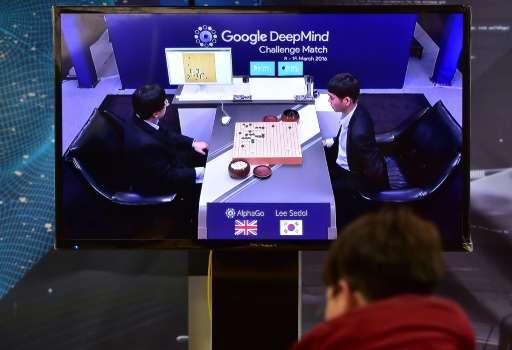

A Google-developed supercomputer stunned South Korean Go grandmaster Lee Se-Dol by taking the first game of a five-match showdown between man and machine in Seoul on Wednesday.
After about 3-1/2 hours of play, Lee, one of the greatest players of the ancient board game in the modern era, resigned when it became clear the AlphaGo computer had taken an unassailable lead.
“I was shocked by the result,” Lee acknowledged afterwards.
“AlphaGo made some moves that no human would ever make. It really surprised me,” he said, adding that the computer had shut out the game “in a perfect manner.”
Despite the shock loss, Lee said he had no regrets and was looking forward to the remaining four matches.
“I had some failures in the early stages today so if I improve on this, I think I still have some chance to win,” he said.
Although the computer had whitewashed European champion Fan Hui 5-0 last October, it had been expected to struggle against 33-year-old Lee, who has topped the world rankings for most of the past decade.
But its creators had been bullish going into the match at the Four Seasons hotel in the South Korean capital, saying the computer, which employs algorithms that allow it to learn and improve from matchplay experience, was even stronger than when it took on Fan.
‘Historic moment’
“We are very, very excited by this historic moment and very, very pleased with how AlphaGo performed,” Demis Hassabis, the CEO of AlphaGo developer DeepMind, said after the victory.
“We think that Lee will come up with new strategies and… try some different things tomorrow. We’ll have to see how AlphaGo will deal with it,” Hassabis said.
The match-up sparked enough interest to warrant an Internet live-stream as well as live TV broadcasts in South Korea, China and Japan.
“I was shocked. Everyone was,” said Kim Seong-Ryong, a Korean Go commentator and professional player.
“Something none of us thought would happen has just happened.”
The five-day battle for supremacy between man and machine has been seen as a major test of what scientists and engineers have achieved in the sphere of Artificial Intelligence (AI) over the past 10 years or so.
The most famous AI victory to date came in 1997, when the IBM-developed supercomputer Deep Blue beat the then-world class chess champion Garry Kasparov.
But experts say Go presents an entirely different challenge as the complexity of the game and almost incalculable number of move options mean that the computer must be capable of human-like “intuition” to prevail.
“Go really is our Mount Everest,” said Hassabis, adding that the public response to the clash with Lee had been “far bigger than we expected.”
When Lee first accepted the AI challenge, he had confidently predicted a clear-cut win, saying that AlphaGo’s performance against Fan had been nowhere near good enough to defeat him.
But the grandmaster had confessed to some pre-match nerves on Tuesday.
Technical breakthrough
Go involves two players alternately laying black and white stones on a chequerboard-like grid of 19 lines by 19 lines. The winner is the player who manages to seal off more territory.
The game reputedly has more possible board configurations than there are atoms in the Universe, and mastery by a computer was thought to be at least a decade away until the victory over Fan last year.
Creating “general” or multi-purpose, rather than “narrow”, task-specific intelligence, is the ultimate goal in AI—something resembling human reasoning based on a variety of inputs, and self-learning from experience
In the case of Go, Google developers realised a more “human-like” approach would win over brute computing power.
AlphaGo uses two sets of “deep neural networks” containing millions of connections similar to neurons in the brain.
It is able to predict a winner from each move, thus reducing the search base to manageable levels—something co-creator David Silver has described as “more akin to imagination”.
[Source:- Phys.org]




